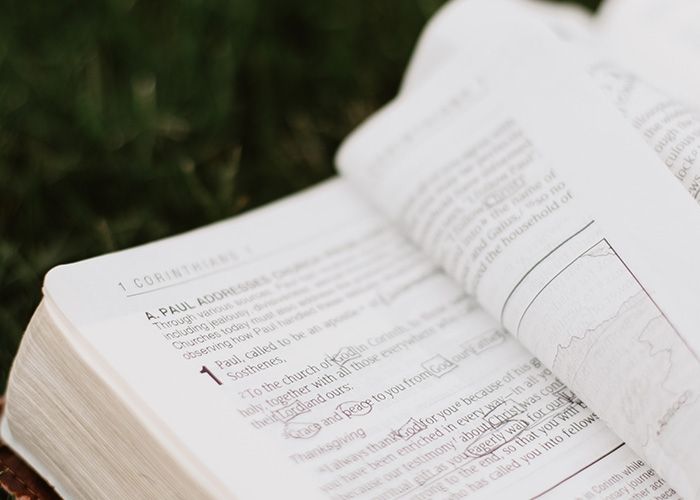Reading and interpreting the Bible through our twenty-first-century sensibilities has its challenges.
Serious students of God's Word will recognize that assessing and applying Scripture faithfully requires at least a cursory grasp of the culture of the original writers. It helps to keep in mind such simple things as that the biblical writers had no indoor plumbing, that transportation involved using either your own or an animal's feet, that electricity wasn't even a spark of an idea.
Not to mention the challenge of writing an entire book with no word processor, typewriter, or even a number two pencil!
On top of such details, knowing that a writer of a particular Bible book was Jewish or Gentile, a prophet or an apostle, a doctor or a fisherman can add to our understanding. It gives us context to wrap around metaphors and figures of speech.
But one other piece of knowledge can also make a drastic interpretative difference: your own personality type.
Are You an Introvert or an Extrovert?
A lot has been written in recent years on the differences between introverts and extroverts. A couple of excellent books are Introverts in the Church: Finding Our Place in an Extroverted Culture by Adam McHugh and Quiet: The Power of Introverts in a World That Can't Stop Talking by Susan McCain.
Generally speaking, extroverts are energized by being around people and groups. They are prone to quick decisions and faster action. Extroverts love brainstorming in meetings, are always ready with a cute quip. They may end up in more outgoing roles in the church, as youth ministers or teaching pastors.
Introverts tend to be quieter, calmer, slower paced. An introvert will mull ideas and seek out more information. They prefer alone time to party time. And as for brainstorming sessions, about an hour or two after the meeting is over they'll suddenly think of the perfect insight. They may end up being church counselors or prayer ministers.
These broad generalizations capture the essence of each, and your type will color how you read the Bible.
Gideon: Strength or Weakness?
Take Gideon for instance. As an introvert myself, I see Gideon as a kindred introverted spirit. (You can read my thoughts in detail here: "Don't be fleeced into thinking of this mighty introvert as one who shilly-shallied".)
However, another writer, Sarah Lebhar Hall, who I suspect is an extrovert, views Gideon as a wimp! (She makes her case here: "Why God gives us weakness".)
Hall writes, "Gideon's story begins in a winepress, where he is threshing his grain to hide it from the enemy. The angel of the Lord appears to him and says, 'The Lord is with you, mighty warrior.' Really? This particular 'mighty warrior' is hiding out—not exactly a valiant act."
My take? Hall's characterization ignores the fact that Gideon was hiding from marauding hordes of ruthless Midianites and their buds who "would come like locusts in number," laying waste to the land, taking everything and anything they wanted by force.
Within the context of the story, hiding in the winepress seems shrewd, especially given the viciousness of those Gideon was hiding from. In other words, Gideon exhibited wise introvert behavior.
Hall, in part, justifies her assessment by citing Hebrews 11:32-35 (ESV):
And what more shall I say? For time would fail me to tell of Gideon, Barak, Samson, Jephthah, of David and Samuel and the prophets— who through faith conquered kingdoms, enforced justice, obtained promises, stopped the mouths of lions, quenched the power of fire, escaped the edge of the sword, were made strong out of weakness, became mighty in war, put foreign armies to flight. Women received back their dead by resurrection. Some were tortured, refusing to accept release, so that they might rise again to a better life.
She hinges her argument on the phrase "made strong out of weakness" assuming that the introversion I see in Gideon is the wimpiness she sees.
The problem with this argument is that Gideon isn't the only person being referenced in the Hebrews passage. Included are "Barak, Samson, Jephthah,…David and Samuel and the prophets." Each can be considered a hero of sorts, and David is famously labeled as a man after God's own heart (Acts 13:22).
The specific, God-given personality types of each of these individuals is not necessarily the weakness being referred to. Rather, their "weaknesses" were more related to the degree to which they depended on God rather than their own strength (knowledge, experience) as they accomplished their tasks.
Why is this Important?
About 50 percent of the population are introverts. If you are an extrovert in a church leadership position, interpreting and preaching on Scripture in a manner that reflects extroverted thinking while however unintentionally slighting the introvert viewpoint as less than ideal, is to present a skewed assessment of the Bible.
After all, "All Scripture is breathed out by God and profitable for teaching, for reproof, for correction, and for training in righteousness, that [extroverts AND introverts] may be complete, equipped for every good work" (2 Timothy 3:16-17 ESV).
Want to learn more about how your personality impacts your reading of Scripture?
Read more posts about: Reading the Bible, Church, Perspective, Daily Life, Identity and Purpose
Thanks to the support of our faithful financial partners, American Bible Society has been engaging people with the life-changing message of God’s Word for more than 200 years.
Help us share God's Word where
needed most.
Sign up to receive Bible-reading tips, tools and resources.



